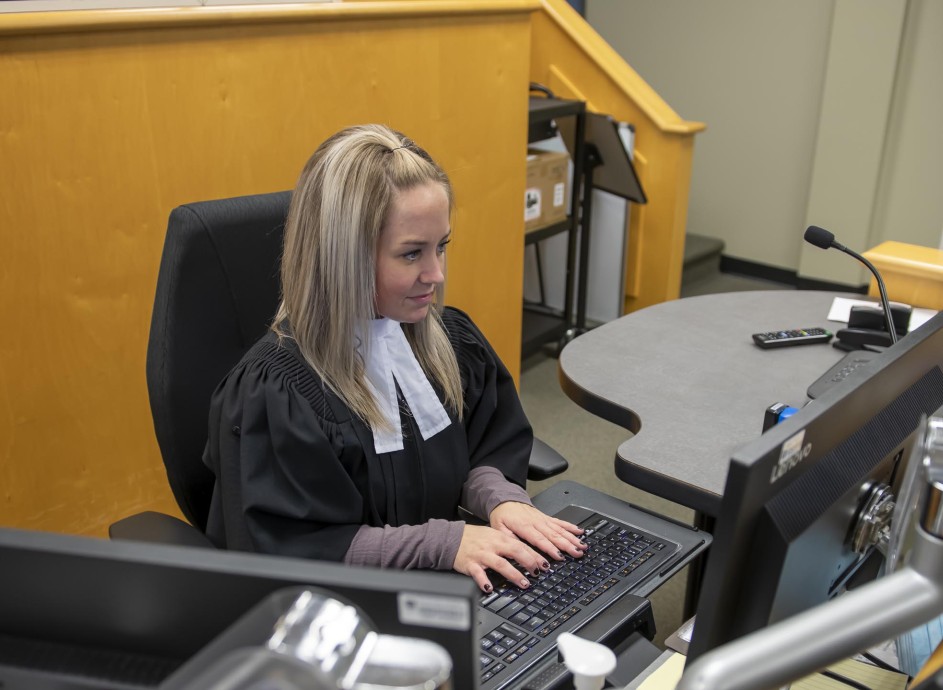Court Support Services

Thank you for your interest! At this time, this program is currently available to International applicants only. Check back soon for updates or connect with us to discuss your program options.
*Domestic applicants include Canadian citizens, permanent residents, protected persons and Convention refugees.
The Court Support Services program is designed to provide you with the specialized knowledge and skills required to work in various court support and court and client service positions for the Ontario Courts, as well as providing specialized evidence recording and interactive learning activities focused on courtroom staff roles with an emphasis on professionalism and decorum. Upon graduating, you can persue a wide range of careers in Ontario Courts, or choose to continue their education through other law-focused programs in the School of Public Safety. Employment opportunities are excellent in this growing sector.
Courses are designed by industry experts to reflect current recruitment needs. You'll gain experience working with both the Ontario and Superior Courts of Justice which oversee various disciplines and jurisdictions of law including Criminal, Family, Civil, and Provincial Offenses.
You'll receive practical instruction using current court software such as Liberty Court Recording, FTR, and CaseLines. Learning is balanced between class and lab time, with the added benefit of observing real court proceedings in action.
Beyond technical knowledge, you will also learn essential professional skills such as courtroom decorum, communication skills, professionalism, and legal knowledge - all key to success in court environments.
This is one of the only programs of its kind in Ontario offering field placements in courthouses. You'll complete 120 hours of placement, in addition to 30 weeks of in-class study, providing invaluable real-world industry experience before you graduate.
Please note: the majority of courses in the Court Support Services program take place after 6 p.m.
Graduates of Fanshawe's Court Support Services program can utilize the specialized knowledge and skills learned through the program to pursue various court support and court client service positions. Graduates will be prepared for a range of careers within the courtroom and various other areas with Ontario Courts.
Did you know Fanshawe consistently ranks high in graduation employment rates among large colleges in Ontario?
Here are some examples of career opportunities for graduates of Fanshawe’s Court Support Services program:
Court Clerk
Perform support functions in courts of law, such as calling court to order, preparing court dockets and maintaining exhibits.
Court Reporter
Record and transcribe verbatim proceedings of courts, legislative assemblies and committees and prepare judges, tribunals and quasi-judicial panels.
Court Services Officer
Be responsible for keeping records of court processes served and enforcing court decisions by executing court orders.
The graduate has reliably demonstrated the ability to:
Modupe Ikenyei
The following items are applicable to the program:
| Level 1 | ||||
| Take all of the following Mandatory Courses: | ||||
| LAWS-1091 | Court Clerk-OCJ Criminal | 3 | ||
| Students will study the role of Ontario Court clerks with respect to assisting the judiciary in a criminal bail, plea, and trial court. The course will focus on principles, courtroom procedures, and operations using Ministry of the Attorney General-approved guidelines specific to the Ontario Court of Justice. | ||||
| COMM-1146 | Professional Communication & Courtroom 1 | 5 | ||
| Students will examine and apply the principles of good written and oral communication including the use of proper grammar, spelling, and proofreading skills. Students will also study the various roles of participants in the courtroom, appropriate courtroom dress, and decorum. The course will address the importance of confidentiality and sensitivity in a courtroom environment. | ||||
| COMP-1551 | Computers & Courtroom Technology | 3 | ||
| In this course students will be introduced to Microsoft Office to create and format court services and other legal-based documents using correct formatting, spelling, and grammar. In addition, students will be introduced to various court technologies used in the courtroom. Students will have opportunities to practice these skills throughout the term. | ||||
| LAWS-1092 | Court Clerk/Registrar-Family Court 1 | 4 | ||
| This course will focus on the principles, courtroom procedures, and operations using Ministry of the Attorney General-approved guidelines specific to the Ontario Court of Justice, Superior Court of Justice, and the Family Court. Students will be introduced to Family Law legislation and rules, proceedings, case management, child protection timetables, and case tracking technology. | ||||
| LAWS-1093 | Canadian Legal System-Intro | 3 | ||
| This course introduces students to the Canadian legal system. Students will examine the parties involved in the legal system in Canada, sources of law, the Constitution, and the Charter of Rights and Freedoms. Through this course, students will gain a general understanding of how laws are defined, created, and interpreted as well as the history, structure, and jurisdiction of Canadian courts. | ||||
| LAWS-1094 | Court Reporter 1 | 4 | ||
| In this course, students examine the role of a court reporter, including how the reporter should interact with other members of the court in a professional and respectful manner. In accordance with Ministry of the Attorney General-approved guidelines, students will learn to record and annotate court proceedings using current digital recording equipment and systems. | ||||
[1] Total program costs are approximate and subject to change. They do not include additional fees such as the health and dental plan, bus pass, or general expenses. Learn more about ancillary and additional fees.